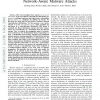Free Online Productivity Tools
i2Speak
i2Symbol
i2OCR
iTex2Img
iWeb2Print
iWeb2Shot
i2Type
iPdf2Split
iPdf2Merge
i2Bopomofo
i2Arabic
i2Style
i2Image
i2PDF
iLatex2Rtf
Sci2ools
CORR
2008
Springer
2008
Springer
An Information-Theoretical View of Network-Aware Malware Attacks
This work investigates three aspects: (a) a network vulnerability as the non-uniform vulnerable-host distribution, (b) threats, i.e., intelligent malwares that exploit such a vulnerability, and (c) defense, i.e., challenges for fighting the threats. We first study five large data sets and observe consistent clustered vulnerable-host distributions. We then present a new metric, referred to as the non-uniformity factor, which quantifies the unevenness of a vulnerable-host distribution. This metric is essentially the Renyi information entropy and better characterizes the non-uniformity of a distribution than the Shannon entropy. Next, we analyze the propagation speed of networkaware malwares in view of information theory. In particular, we draw a relationship between Renyi entropies and randomized epidemic malware-scanning algorithms. We find that the infection rates of malware-scanning methods are characterized by the Renyi entropies that relate to the information bits in a nonunform vul...
CORR 2008 | Education | Network-aware Malwares | Non-uniform Vulnerable-host Distribution | Vulnerable-host Distribution |
| Added | 09 Dec 2010 |
| Updated | 09 Dec 2010 |
| Type | Journal |
| Year | 2008 |
| Where | CORR |
| Authors | Zesheng Chen, Chuanyi Ji |
Comments (0)

